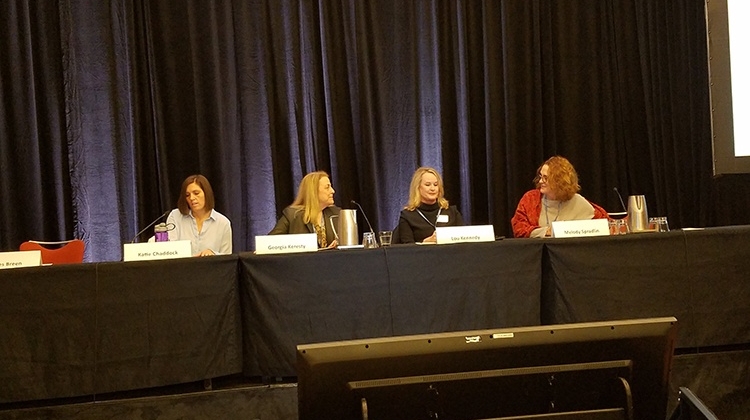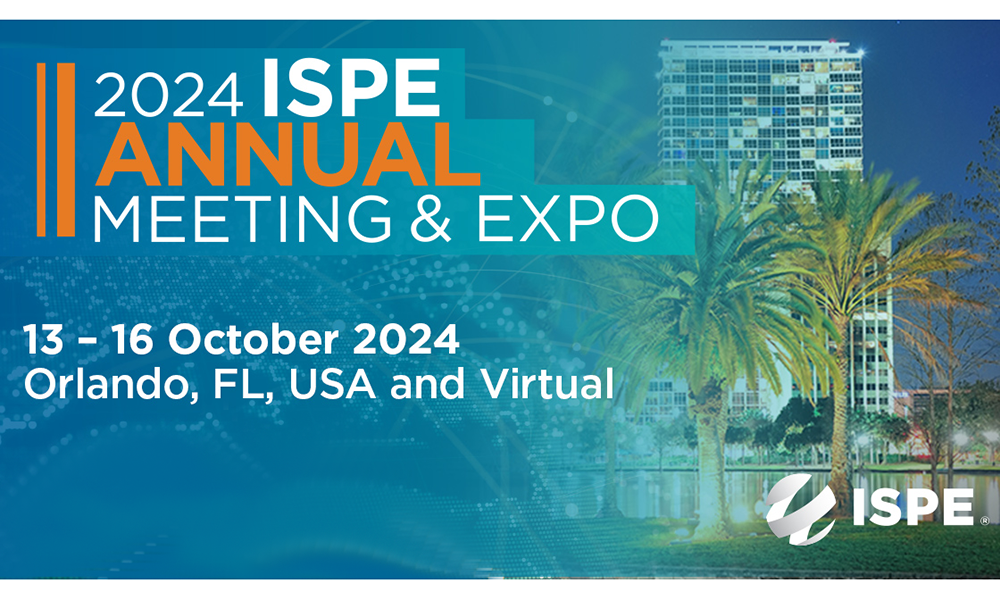Women in Pharma®: Proactive Career Design Pointers

The theme of “Proactive Career Design” for the Women in Pharma® (WIP) Breakfast Session at the 2020 ISPE Facilities of the Future conference on 31 January in San Francisco was a fitting one: design and implementation apply equally well to careers as to pharmaceutical facilities. The panelists provided “nuts and bolts” experiences and ideas that are helpful to constructing careers for all pharmaceutical engineering professionals.
Janette Buechler, Sales and Marketing Communication Manager for Pharmatech Associates, introduced the session and Women in Pharma® with an overview of Women in Pharma® initiatives and information.
James Breen, VP Project Lead, Biologics Expansion, Janssen Pharmaceuticals and Program Planning Co-Chair for the Facilities of the Future conference was the session leader and managed the lively panel discussion, including posing specific career-based queries to the panelists:
Career Beginnings
Lessons learned from the start of a career prove valuable to those on their way to building a proactive career. Spradlin talked about what she learned early on. “When I started, I would take a lot of time to understand the exact assignment, then I put my head down and it was work, work, work. I wish I would have learned it is really a network,” she said, likening the work network to a forest and trees. Take time to understand the network, she said. “The task is important but your team is important; they all are interconnected like everything in the forest. Listen, and understand how you impact others.”
Keresty added, “You have the opportunity to be very thoughtful and very planful about certain aspects of your career so you are never caught off guard and you are always prepared for that unexpected opportunity.” She noted that some career decisions are up to the individual, including whether you want to supervise broadly or deeply; whether you want to travel a lot or relocate; and how you want to balance some of these options with your personal life, child care, elder care, or going back to graduate school. “Think about these when you are relaxed and don’t have something right in front of you. A big part of your career will be unplanned. But be prepared and think through these things. Then you are in a much better position to weigh those different factors, and also in a better position when you need to say no. Planning for them and thinking about your career—that’s proactive.”
When asked about advice that she has received over the years about building a career, Chaddock said, “I’ve gotten lots of advice! It’s always important to be a rock star. A mentor told me that this is easy when you love the job—but you also must do it when you are struggling. That’s what people remember and that’s what makes you shine. The second piece of advice: always bring your authentic self to work.” This is not about conforming, as Chaddock said she thought early on in her career; instead, being your authentic self is the way to build connections for the future.
When it comes to influencers in building her career, Kennedy cited parents, a college advisor, and her husband. But her own drive to “dive in—not lean in!” Has been significant as well. “Knowledge is power: learn what you need to learn. I try to lead myself—I push myself harder than anybody.”
Career Planning
When asked about the biggest obstacles to advancing her career, Spradlin said her family moving around a lot when she was growing up was a challenge. Even with a plan, sometimes things would change with the moves and new schools. Having curiosity and being able to step outside of the usual became strengths for her in her career. “When something unexpected happens, look at your plan, reassess, and move forward.”
Keresty addressed leadership of others to proactive careers, and spoke about interactions with supervisors. “When you sit down with your supervisor, you are on same page with them when you are proactive and you can have a really robust conversation about you.” Honesty with your supervisor is best, she said, because it helps you and your supervisor to be on the same page, and will help you feel a sense of control in managing your career.
Resources for career planning shared by Chaddock included SWOT analysis, personality tests, Korn Ferry’s leadership assessment, Insights (a tool that shows the energy you bring to work and also those around you)—and she noted there are many tools. “No matter what you use, listen and apply the data, and make a plan. Mentors, sponsors, and advocates can all help with your career plan, she said. “Understand the differences between these: a mentor can challenge who you are, what you are thinking, what you want in life, and help make big decisions. Sponsors and advocates could be many people who know the quality of your work and can vouch for you when opportunities come up.”
Innovative Career Ideas
In response to a question about innovative ideas and strategies at her organization to help employees become more proactive in their careers, Kennedy provided details about the steps that she has taken in her organization to achieve this.
She sees it as a war on talent and her weapons have been highly practical actions to build and expand the workforce serving her company—and to build opportunities for her workforce to grow their careers and commitment to STEM. These include an apprentice program run through a local technical college and university partnership with the labor department to provide opportunities to workers; a pharma tech program for entry-level jobs at the company that after training lead to an increase in pay and a career path; a new initiative is asking a local school to create a program for individuals who have an interest in the pharmaceutical industry to provide training in manufacturing so that the students can then enter the manufacturing workforce with skills. In March 2019, Kenney’s company began a program to bring in local teachers for tasks including shipping, which now provides 750 local educators with additional pay from the part-time positions—and has had an added and unforeseen benefit: the teachers are bringing back to the classroom information about the mission of pharmaceutical manufacturing, and encouraging students to consider STEM careers. The word is also spreading to spouses and siblings of this workforce, helping to make it clear that a science degree is not needed to have a career in pharmaceuticals.
A focus on diversity among her company’s workforce is another weapon in the war to build a workforce, Kennedy noted. Her company also pairs senior veterans with younger workers to “watch them blossom and bloom.” Kennedy speaks regularly to share the message about opportunities for women and young people about the pharmaceutical industry.
Questions & Answers
Panelists fielded questions from the audience after their presentations and discussion.
What are some do’s and don’ts to managing young women in the workplace?
Kennedy replied that instead of looking at gender, the focus should be on whoever can do the job, and they should be paid accordingly. “The more you encourage young women to step out and be bold,” the better, she said. “I find women are the last to ask for a raise but men don’t seem to have a problem with this,” she noted. “I tell the women to tell me what you think. It’s about the brains and job at hand, not so much gender.”
Keresty added, “I would give this advice to anyone with a workforce of early career professionals: be respectful and listen. Understand who they are, where they want to go, how they see themselves, how can you help them.”
Chaddock said, “A career is not just career. It is about all things around you,” including family. Understanding the whole person helps those you manage to be authentic at work.
Being sensitive to interactive social situations can be helpful, noted Spradlin. “Early in my career in military and construction, many social events were at bars or strip clubs.” Such options for social interaction may not appeal to all employees, so having diverse events for different people based on culture, religion, and gender can encourage employees to participate as their authentic selves.
How have you built a network of advocates and sponsors? How have you maintained it over your career to leverage it for career growth?
“See who you are like-minded with, and who inspires you,” Kennedy suggested. “People are usually flattered to be asked.” Involvement with others at work and in your community are also ways to build a network. Chaddock added that asking your network for others to connect with is a good tactic.
Consider opportunities for coffee or a meal, Keresty said. These are very simple ways to connect. Volunteering with ISPE is another way: local chapter work, taking notes at meetings, joining a Guidance Document team to name a few are all ways to contribute and to build a network.
At what point has someone intervened at a key point in your career and helped your direction?
Chaddock recalled having a great mentor early on and this helped. “A mentor is someone who can step in to say, here is an opportunity to go somewhere a bit risky, learn, and based on what you are telling them, can push you to have those kinds of thoughts.”
What is the biggest step a leader can take to move ahead?
“Don’t be afraid to take challenges that are uncomfortable for you,” Chaddock said. “Sometimes you’ve just got to jump in. If it doesn’t work, it’s not a failure--it is an iteration in learning. The more opportunities you take, the more you learn.”
What skills are you looking for? How do we stand out?
Your knowledge of engineering is assumed with your degree, “and we know you are smart,” Kennedy said. What you do outside of school, including work, clubs, leadership positions—this is of interest to companies looking to hire. “I’m looking straight into your eyes for honesty and work ethic,” she said, adding it is easy to hire smart people, but less easy to hire a well-rounded “do-er.”
Spradlin suggested demonstrating integrity and resilience. You may be asked about a failure you experiences, so show with integrity how you bounced back.
“Take pride in work you have done, and don’t be afraid to highlight something that was significant during your college years, whether research, leadership role in a professional society, or being a dorm director,” Keresty said. “Sometimes women are a little less willing to talk about their accomplishments and achievements to really show that they made a difference. You don’t need to have 100 of them, just one or two.”







